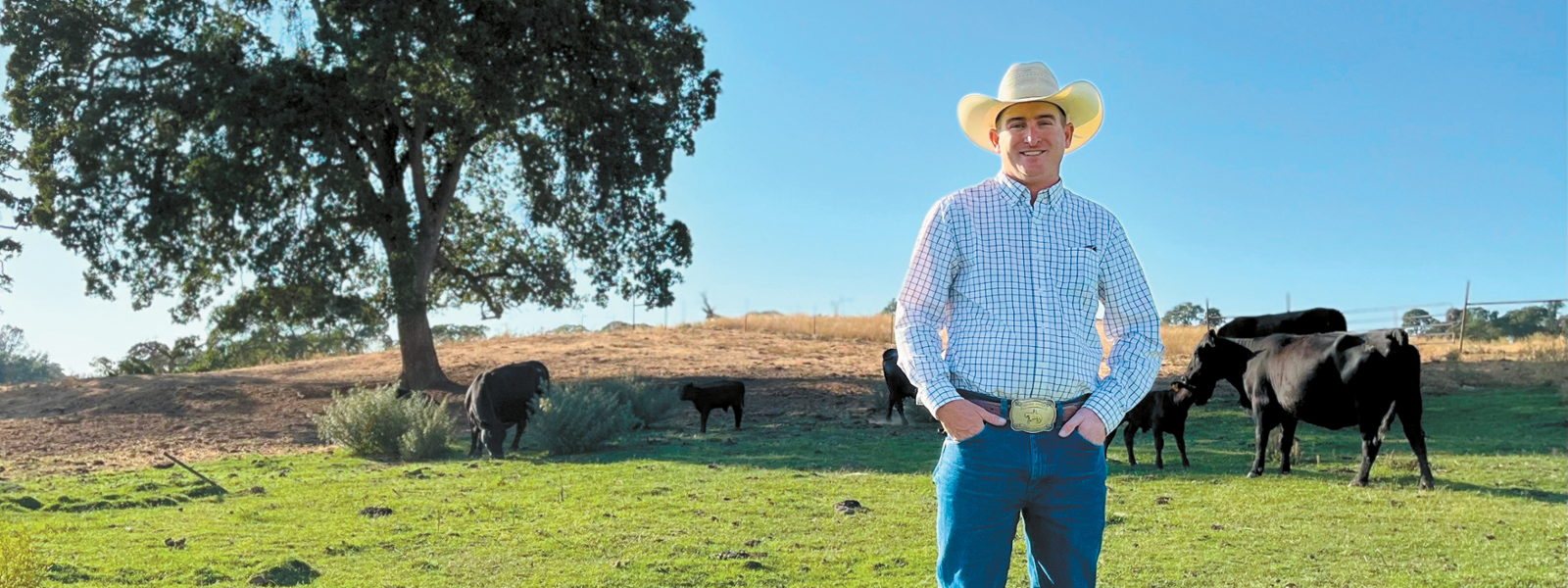Young rancher keeps family tradition alive raising cattle

Calaveras County rancher Trevor Airola owns Ranch 75 Cattle Co., which he started to continue the family’s ranching legacy. He says starting a business is challenging for many young farmers.
Photo/Josh Swanson

By Christine Souza
(This is the first of a three-part series highlighting individuals in California Farm Bureau’s Young Farmers & Ranchers program.)
Trevor Airola’s third great-grandfather immigrated to California from Italy in 1856, not long after the peak of the Gold Rush.
Carrying on the family’s ranching legacy, Airola runs a small cattle operation and represents his family’s sixth generation in Calaveras County.
“My family didn’t mine the gold, but they sold the shovels and the pans,” he said, explaining that his ancestors owned a general store and later entered the cattle business in Angel’s Camp, the Gold Country town made famous by Mark Twain’s short story, “The Celebrated Jumping Frog of Calaveras.”
Generations later, Airola’s father returned to the family ranch in the 1980s, raised cattle for 10 years, and then leased the land. Having grown up in the business, Airola said he was interested in keeping the family’s ranching tradition going.
He owns Ranch 75 Cattle Co., an operation of 45 cow-calf pairs of Angus cattle, and leases 600 acres from his father.
“A few years ago, I had the opportunity to take over the lease on the ranch. I got a loan to buy some cows and started on my own,” Airola said.
He runs the ranch while also managing a full-time job as a vegetation management inspector subcontracting with Pacific Gas & Electric Co. “With the ranch,” he said, “what it’s all about for me is just preserving the legacy.”
Keeping such history alive and jumping into farming and ranching as a beginner is not always easy.
Danielle Vietti, vice president at AgWest Farm Credit in Tulare, said “The high barrier of entry for young, beginning and small farmers is a real challenge. There are many challenges for those just starting out.”
Vietti said it is tough for young people to start a farm or ranch of their own due to increasing startup costs, high interest rates and a lack of access to land, equipment and financial assistance.
“Every generation had to start new,” Airola noted, discussing the traditions he is now living up to. “We were told to build our own thing from the ground up. It was, ‘I’ll sell you some cows, but you’re not going to inherit my cows—you have to earn it like I did.’”
Many young farmers and ranchers lease farmland from individuals. Airola said a challenge is when the owner decides to sell the land, which means leaseholders are left scrambling for alternatives.
In addition, the cost to purchase land is expensive, he said.
“Some dry ground sells for about $3,500 per acre, and valley ground near Stockton is $25,000 to $30,000 an acre, depending on where it is,” he said. “Plus, it is hard to find a mid-size tractor for less than $200,000.”
While beef prices are high, Airola said, the cost of farming has gone up. Ranchers are paying more for feed, fuel, veterinary services and regulatory-related expenses.
He said, “People have been selling off their herds and cutting back on numbers so that they don’t have to feed as much hay.”
To network with others in agriculture, Airola is active in the California Farm Bureau Young Farmers & Ranchers, a program for agriculturalists between the ages of 18 and 35. The program offers leadership opportunities through involvement in Farm Bureau at the county, state and national levels.
“I’ve developed friendships across the state with other farmers and other ranchers who are facing the same challenges,” said Airola, who previously served as president of the Gold Country YF&R and last year won the program’s discussion meet contest.
He now serves on the YF&R State Committee and the Calaveras County Farm Bureau Board of Directors.
“I think we can definitely feel kind of isolated in our own farms and businesses, and you realize that there’s this whole family of people that are having the same struggles,” he said.
Airola and his wife, Jillian, have a 2-year-old daughter, Olivia, who represents the family’s seventh generation.
Active in FFA during high school, Airola earned a Bachelor of Science degree from California State University, Chico, and a teaching credential. He taught high school science and agriculture for seven years until 2020.
“I needed to do something different,” he said of the move, adding his daughter was born in June 2021 and he was looking for a better work-life balance.
As for his time on the ranch, Airola said he enjoys the quiet.
“The ranch is a nice spot where I can go, and it’s just me and the cows, and success or failure is nobody’s fault but my own,” Airola said. “I have a passion for it, and it keeps the legacy going.”
To help young, beginning and small farmers with financing for real-estate purchases, operating expenses, livestock and equipment, debt refinancing and more, AgWest Farm Credit launched the program AgVision. Learn more at www.agwestfc.com.
For more information on beginning farmer loan programs through the U.S. Department of Agriculture Farm Services Agency, visit the agency’s Beginning Farmers and Ranchers Loans page.
(Christine Souza is an assistant editor of Ag Alert. She may be contacted at csouza@cfbf.com.)




